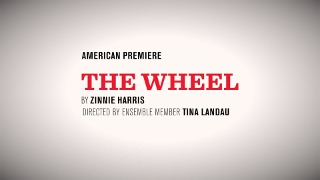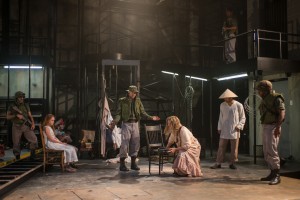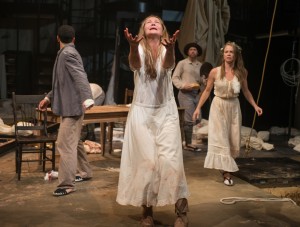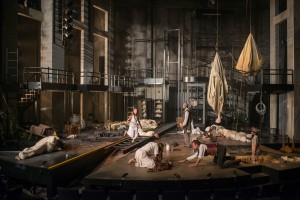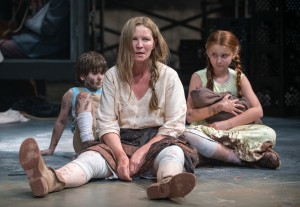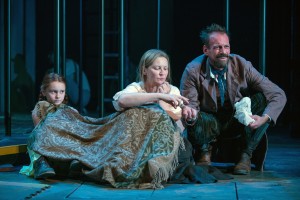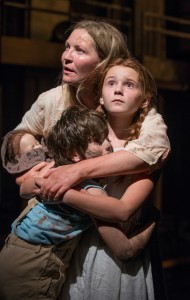A TRAIN TO NOWHERE
It’s not enough reason for Joan Allen’s Chicago comeback. She returns to her ensemble-thick roots on the Steppenwolf stage after a 22-year absence during which, among other cinema roles, she three times pursued Jason Bourne. Now the screen star finds herself in The Wheel, a vehicle that’s both sprawling and stunted. Zinnie Harris’s two-hour, no-intermission epic is billed as “magic realism.” And, yes, there’s some twisted wishful feeling in this tale of a reluctant heroine’s journey across centuries of war to protect an enchanted girl who’s both sporadically beneficent and unpredictably destructive. But it’s a means without an end.
Playing a cross between a virtuous Mother Courage and Harriet Tubman, Ms. Allen depicts childless Beatriz, first seen in the early 19th century at her sister’s wedding in San Sebastian in northern Spain. Period songs from the 17-member ensemble convey an illusion of normality. But Napoleon’s soldiers are on the horizon: The wedding is disrupted by local resistance fighters, farmhands turned defenders of their homeland. They crash the reception and cause confusion. Accusing a local merchant of collaborating with the French, they cart him off, leaving his unnamed daughter to fate. Fate in this case is Beatriz, suddenly a protective mother caught up in a world at war. She is all conscience but has no interest in sheltering the girl from calamities that suggest future wars as well (there are allusions to World War I and Vietnam in the play, among others).
Intent on prevailing, strangely susceptible to smells, and declaring herself “no soft touch,” a grudgingly maternal Beatriz embarks on a picaresque journey through a ravaged world, scrounging for food or offering her boots as bribes. She meets an insect-lover (Mark Montgomery) who allows us to see that the mute girl can bring dead things to life (and, later alas, the opposite). She picks up both a fever-ridden boy and a baby forsaken by its mother after she succumbs to barbed wire. Beatriz seeks a train without a ticket. Soldiers appear out of trap doors as Beatriz bargains for their lives, always seeking to reunite the girl with the father who Beatriz knows must be heartbroken without his child.
But this child turns out to be an angel of death more than an innocent refugee, capable of occasional miracles but mostly mayhem. By play’s end, The Wheel asks quite literally: Given a Groundhog Day-style “do-over,” would Beatriz repeat her good deed, knowing what has happened before? Should we take a chance on mercy and kindness, especially during cruel times? Or is self-preservation’”the very excuse for the war to start with’”the sole standard for survival? Maybe, just maybe, everything depends on making sure the wheel on a barrow is securely fastened (hence the title).
For many, the perversely unresolved ending of Harris’s overextended one-act will be the final disappointment. We’re trapped in a parable without a point. It doesn’t help that the dialogue is fairly flat with no lyrical uplift, poetic urgency or effective comic relief. But then this play is about persistence and it’s not pretty. Toward what end is left–without mercy’”for the audience to determine. You could call it a cop-out.
But there’s nothing uncertain about Tina Landau’s sweeping staging, where scaffolding and rolling props keep the action exciting even if the destination eludes us. Allen’s dogged and driven Beatriz holds together the vast cast with its time-traveling costumes and robust cameos. Ora Jones is wickedly realistic as a madame trying to escape, Robert Breuler reassuring as the village philosopher, and Yasen Peyankov winsome as a train conductor without a train. There’s intensity galore but the energy seems wasted: This story is much smaller than its settings.
The Wheel
Steppenwolf Theatre Company
scheduled to end on November 10, 2013
for tickets, call 312-335-1650
or visit http://www.steppenwolf.org
for info on this and other Chicago Theater,
visit http://www.TheatreinChicago.com
